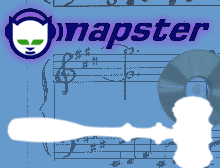|
Judge nixes Napster
|
 |
March 6, 2001: 6:09 p.m. ET
Song-swapping service will comply with court order to remove copyrighted titles
|
NEW YORK (CNNfn) - Song-swapping service Napster said late Tuesday it would comply with a judge's order to remove all copyrighted material from its system within three days but said it will continue to seek a settlement with the recording industry to keep its service alive.
"As we receive notice from copyright holders as required by the Court, we will take every step within the limits of our system to exclude their copyrighted material from being shared," Napster said in a statement.�
The order, handed down late Monday by U.S. District Judge Marilyn Hall Patel, came a day after Napster had installed software to block select titles from being transferred through its system, which users already had found ways to defeat.
Under the order, the large recording companies that sued Napster for copyright infringement must provide Napster with lists of songs they want removed from the system.
A spokeswoman for the Recording Industry Association of America (RIAA), which represents the companies that sued Napster, said the group's attorneys received the injunction late Monday night.
Chuck D, a founding member of rap group Public Enemy and a proponent of Napster, told CNNfn's N.E.W. Show the decision will hurt both artists and consumers. (492K WAV or 492K AIFF)
Patel's order was the latest blow to Napster, whose peer-to-peer file-sharing technology enables users to share the music files on their computers' hard drives.
 In February, judges of the 9th U.S. Circuit Court of Appeals in San Francisco sent the original injunction order Patel imposed on Napster back to the lower court, requesting that she clarify it. In February, judges of the 9th U.S. Circuit Court of Appeals in San Francisco sent the original injunction order Patel imposed on Napster back to the lower court, requesting that she clarify it.
Patel imposed the injunction last July, ordering Napster to eliminate all copyrighted material from its service.
The appeals court said that injunction was "overbroad because it placed on Napster the entire burden of ensuring that no 'copying, downloading, uploading, transmitting, or distributing' of plaintiffs' works occur on the system."
In the new injunction order, Patel told the music industry to catalog the copyrighted songs it wants removed from the system, after which Napster will have 72 hours to block the sharing of those files.
Patel's ruling does not mean Redwood City, Calif.-based Napster has to shut down its service, stressed Eric Sheirer, an analyst with Forrester Research.
Click here for PDF version of the court order
"What it does is give the record labels a great deal of power over exactly what songs are going to show up on Napster, how long they're going to be there, and how usable Napster will be for the vast number of consumers that are on there now," Sheirer said.
"The record industry has the advantage now of being able to get these songs off Napster any time they choose," Sheirer added. "But if they do it now, consumers will flee to all these other alternative services where they won't be able to control them."
Hilary Rosen, president of the RIAA, said the group is "gratified the District Court acted so promptly in issuing its injunction requiring Napster to remove infringing works from its system." She also said the group plans to fully comply with the court's order.
With its song-blocking software, which became effective Sunday night, Napster had tried to block titles provided to it by the recording companies. However, the software is effective only in blocking specific song titles and does not prevent users from finding files with misspelled names or those that have been purposely re-named in order to thwart the system.
If Napster chooses to appeal the latest order, it would need to return to the 9th U.S. Circuit Court of Appeals, according to Kevin Grierson, an attorney who specializes in intellectual property law.
Considering that the new order appears to do specifically what the Appeals Court said it should, it is unlikely Napster would have much success if it takes that route, Grierson said.
"Napster as we understood it is going to go by the wayside," he said.
Patel acknowledged that it might be difficult for Napster to identify all variations of a copyrighted song, given that Napster users could use code words or shorthand to identify different pieces of music. "This difficulty, however, does not relieve Napster of its duty," she wrote.
But Napster is not ready to give up.
"The 9th Circuit and the District Court rejected the recording industry's argument that Napster is inherently illegal. The District Court's order holds that the recording industry and Napster share the burden of complying," Napster said.
The company said part of its intended settlement with the record labels would include the development of membership-based service that would make payments to artists, songwriters and other rights holders.
All parties are due to meet with a mediator Friday.
In a separate action Tuesday, the producers of last month's Grammy Awards sued Napster for facilitating illegal trading of music files from the show, including rap star Eminem's duet with Elton John.
The suit filed in San Francisco Federal court is seeking monetary damages for millions of dollars lost because of online trading activity on Napster. 
- from staff and wire reports
|
|
|
|
|
 |

|

